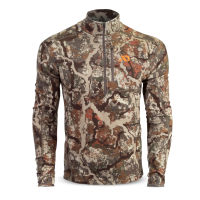How Do Deer Respond to Floods?

Early last summer, heavy rain caused swollen creeks and rivers to flood prime whitetail country across Iowa, Nebraska, Ohio and Missouri. This spring, it happened again as unseasonal snowfall and biblical rains swallowed up farmland in South Dakota, North Dakota and Illinois. For some hunters, this could be the first time their property has ever felt the rising tide from Midwestern storms. For others, it’s an annual occurrence.
I reached out to hunters across the country who own land that sees regular or irregular flooding. Their firsthand experiences with floods and deer movement is invaluable for those wondering how a herd reacts.
Jay Siske from Tennessee said that about 20% of his 130-acre farm floods every few years. He can count on losing some deer when that happens.
“Last time the area got water our top hit list buck disappeared. We had a bunch of trail cam pics of him right up until the flood, and then he was gone,” Siske said. “I think he was bedding in the area that got flooded so he had reason to leave. Even when it dried up, he never returned.”
Overall, though, Siske said the floods don’t change much for him. He said the deer often stay right along the edge of the flooded section and reoccupy the ground as waters recede.
“The water will stay for about 2 to 3 weeks, but for the most part, deer activity stays the same,” Siske said.
Brad Hockersmith of Illinois has more of a love-hate relationship with floods. His property has flooded each of the last three years, including twice in 2017. The standing water kills his food plots and brings in debris, but concentrates the deer.
“They will use different trails, which also kind of helps me and makes natural pinch points,” Hockersmith said. “It allows me to be able to focus on a few food plots rather than the other ones in the river bottom. At the same time, it reduces the available timber space and food, causing some deer to leave the area.”
Parker Cupp, of Michigan, also has mixed feelings about the annual flooding his property experiences during spring thaw. On one hand, it kills vegetation that otherwise makes for ideal bedding, but on the other, it makes locating deer simpler.
“It’s hard to believe, but the way deer respond makes them easier to hunt,” Cupp said. “This farm is small and has limited bedding options. Ultimately, what this flooding does is push the deer out of the center of the property where bedding and flooding is located. In return, this forces deer to spend more time where it is accessible to hunt them and makes mature bucks more visible.”
Like Siske and Hockersmith, Cupp noted that he also loses a few deer to other properties during high water. They almost always return when bedding and food are available post-flood, though. This observation agrees with what biologists have seen.
“Numerous studies have shown that bucks are extremely loyal to their adult home ranges,” the QDMA said in a2013 article. “The results of a 2011 University of Arkansas study greatly reinforced the idea that bucks are strongly loyal to their established home ranges even in adverse conditions.”
In the study referenced, 18 GPS-collared bucks on an island in the Mississippi River were tracked during a 2011 flood. Five of the bucks were so devoted to the island that they stayed there even as the 7,645-acre chunk of land shrunk to only 11 acres. All five of those deer died from the flood.
The other 13 bucks moved to higher ground as river levels rose. Amazingly, all 13 bucks returned to the study area following the month-long flood, even though some of them traveled many miles to escape the water.
“Many hunters wonder if disturbances of various kinds can force deer to abandon an established home range, or whether deer will permanently leave a home range in search of better conditions,” the QDMA wrote.
Come hell or literal high water, whitetails stay true to the ground they’re familiar with. Hunters with displaced herds can count on deer returning someday, even if right now you’d need a boat to get to your treestand.
Shop
Sign In or Create a Free Account
Related

Manage
How Do Deer Survive a Polar Vortex?

Manage
10 Natural Food Sources Every Deer Hunter Should Know




